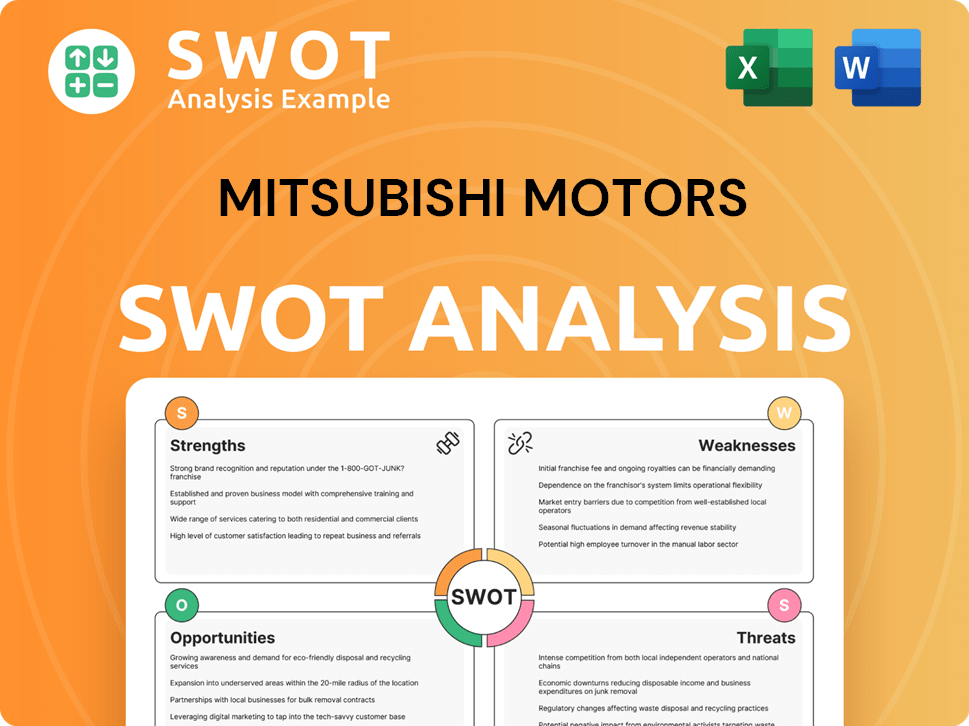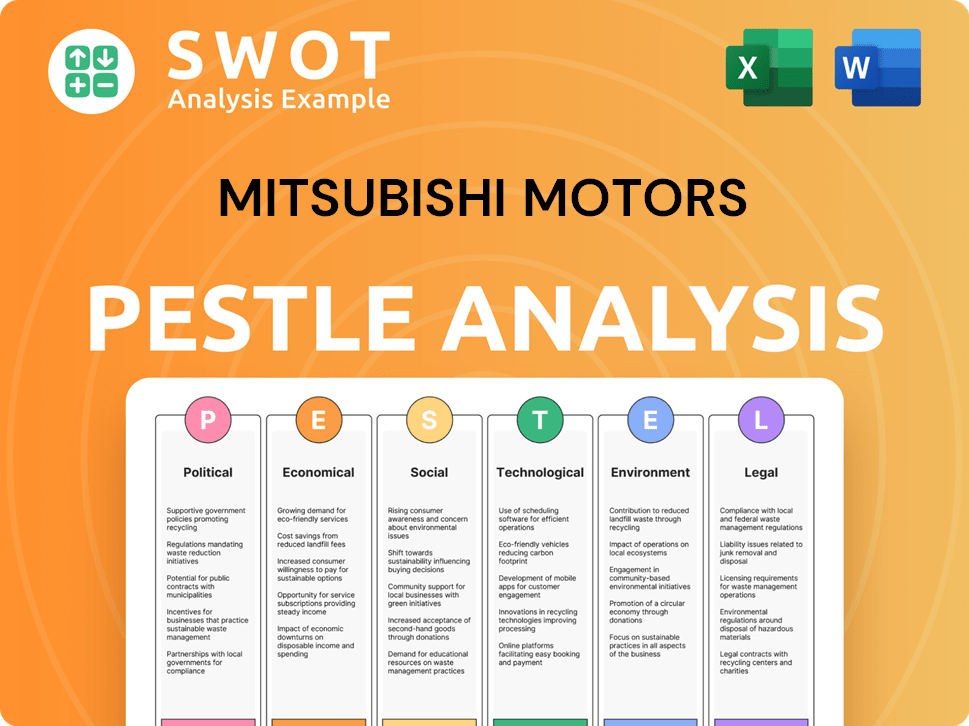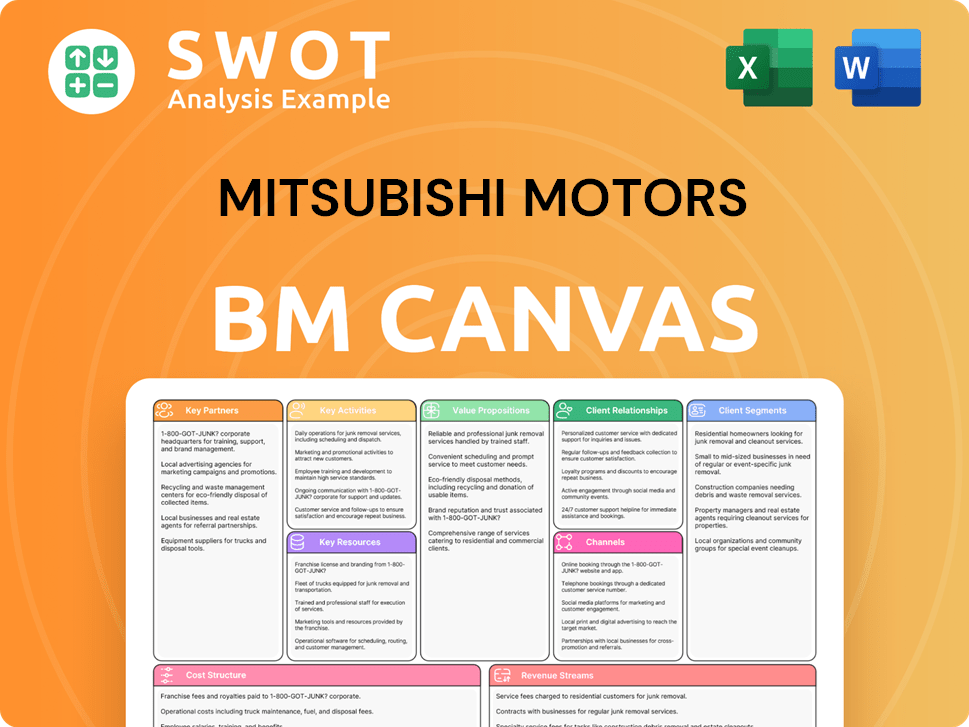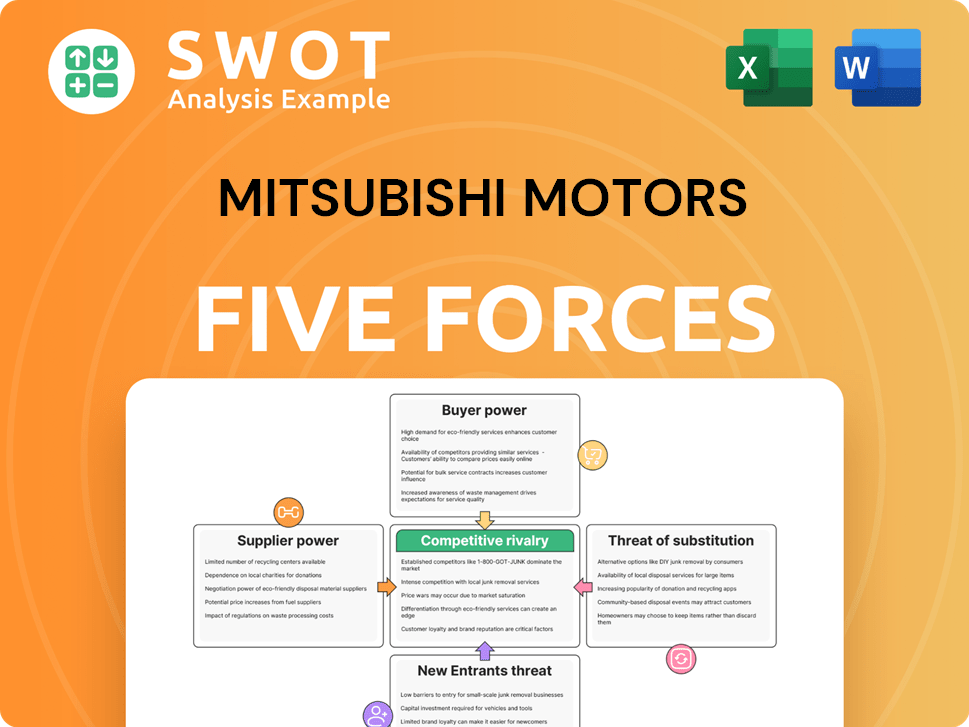Mitsubishi Motors Bundle
What Drives Mitsubishi Motors' Future?
Understanding a company's core principles is key to evaluating its potential. Mitsubishi Motors Company, a global automotive leader, relies on its mission, vision, and core values to navigate the dynamic industry landscape. These elements shape its strategic direction and define its commitment to stakeholders.

This exploration delves into the Mitsubishi Motors SWOT Analysis, unpacking the company's mission statement, vision, and core values to reveal its strategic objectives. Examining these elements provides insights into how Mitsubishi Motors Company aims to achieve its long-term goals and adapt to evolving market demands. Understanding Mitsubishi Motors' mission and vision offers a glimpse into its commitment to innovation, sustainability, and customer satisfaction, shaping its brand values and guiding principles.
Key Takeaways
- Mitsubishi Motors' mission, vision, and values underpin its strategic direction and corporate identity.
- The company's focus on sustainability, electrification, and regional growth aligns with its guiding principles.
- Core values like "Dream Big" and "People First" shape employee behavior and business practices.
- Alignment with business plans like 'Challenge 2025' and 'Momentum 2030' demonstrates strategic influence.
Mission: What is Mitsubishi Motors Mission Statement?
Mitsubishi Motors' mission is to provide new experiences for our customers with creative products and service excellence. Make positive contributions to the sustainable development of our society. Act sincerely as a trusted company. Enhance stakeholder value by leveraging the Alliance.
Let's delve deeper into the multifaceted mission of Mitsubishi Motors.
The core of the Mitsubishi Motors Mission revolves around delivering "new experiences" through innovative products. This customer-centric approach drives the company to continuously develop creative solutions. Recent examples include advancements in their SUV lineup and the ongoing refinement of their electric vehicle technology.
Service excellence is a critical component of the Mitsubishi Motors Mission. This involves not only the quality of their vehicles but also the customer experience throughout the ownership journey. Initiatives include improved after-sales service, digital platforms, and enhanced customer support channels.
A key aspect of the Mitsubishi Motors Mission is its dedication to sustainable development. This is reflected in their investments in electric and hybrid vehicle technologies. The company aims to reduce its environmental impact by offering more eco-friendly options, aligning with global sustainability goals.
Acting "sincerely as a trusted company" is a cornerstone of the Mitsubishi Motors Mission. This involves maintaining high ethical standards, transparency in operations, and building strong relationships with stakeholders. This commitment is crucial for long-term success and brand reputation.
The Mitsubishi Motors Mission includes enhancing stakeholder value by leveraging the Renault-Nissan-Mitsubishi Alliance. This strategic partnership allows for shared resources, technology, and market access. This collaboration is essential for achieving economies of scale and driving innovation.
The Outlander Plug-in Hybrid is a prime example of the Mitsubishi Motors Mission in action. It showcases the company's commitment to creative products (hybrid technology), sustainable development (reduced emissions), and providing a new driving experience. For more insights, see the Marketing Strategy of Mitsubishi Motors.
The Mitsubishi Motors Mission is a dynamic framework that guides the company's actions, focusing on customer satisfaction, social responsibility, and strategic partnerships. It's a comprehensive approach that aims to create value for all stakeholders while contributing to a sustainable future.
Mitsubishi Motors SWOT Analysis
- Complete SWOT Breakdown
- Fully Customizable
- Editable in Excel & Word
- Professional Formatting
- Investor-Ready Format

Vision: What is Mitsubishi Motors Vision Statement?
Mitsubishi Motors' vision is 'Create vibrant society by realizing the potential of mobility.'
Let's delve into the profound vision of Mitsubishi Motors. This vision statement encapsulates the company's aspirations and future direction, providing a clear understanding of its long-term goals and strategic objectives. Understanding the Mitsubishi Motors Vision is crucial for investors, analysts, and anyone interested in the company's trajectory. This vision goes beyond simply selling cars; it's about shaping a better future through innovative transportation solutions. This ambition is a cornerstone of the Mitsubishi Motors Company's identity.
The core of Mitsubishi Motors' vision is its commitment to creating a vibrant society. This goes beyond the automotive industry, aiming for a positive impact on individuals and communities. This commitment reflects a deep understanding of corporate social responsibility.
Mitsubishi Motors aims to be at the forefront of innovative transportation solutions. This includes advancements in electrification, autonomous driving, and connected vehicles. This focus is a key element of their Mitsubishi Motors Strategy.
Mitsubishi Motors has set ambitious targets for electric and hybrid vehicle sales. They aim for electrified vehicles to constitute 50% of global sales by 2030 and 100% by 2035. These Mitsubishi Motors Goals demonstrate a commitment to sustainability.
The vision encompasses streamlining and optimizing the movement of people. This promotes new challenges and economic activities. This focus is a key part of their Mitsubishi Motors Mission.
Mitsubishi Motors seeks to empower individuals through enhanced mobility. This includes providing access to transportation solutions that improve quality of life. This vision is a core aspect of the company's values.
The vision is future-oriented, focusing on long-term sustainability and innovation. This forward-thinking approach is critical in a rapidly evolving industry. This is reflected in their Mitsubishi Motors Core Values.
The vision is both realistic and aspirational, given the ongoing advancements in mobility. The company's focus on electrification and autonomous driving, as outlined in their Challenge 2025 plan, indicates a clear path towards realizing this vision. For a deeper understanding of the company's origins and evolution, consider reading a Brief History of Mitsubishi Motors. The vision's emphasis on 'realizing the potential of mobility' suggests an ambition to be at the forefront of innovative transportation solutions. This ambition is a key driver of their strategic objectives. The company’s commitment to sustainability and innovation is further reinforced by its long-term goals. Mitsubishi Motors' approach reflects its guiding principles and commitment to its brand values. Understanding the Mitsubishi Motors mission statement explained provides further insight into the company's core purpose. The company's corporate social responsibility initiatives are also aligned with its vision for sustainability. The company's ethical guidelines and commitment to quality are all integral to achieving its vision. The company's customer focus is a crucial element in its overall strategy. The company's long-term goals are ambitious, but with the right strategic objectives, they are achievable. These elements are crucial for investors and stakeholders seeking to understand the Mitsubishi Motors vision for the future.
Mitsubishi Motors PESTLE Analysis
- Covers All 6 PESTLE Categories
- No Research Needed – Save Hours of Work
- Built by Experts, Trusted by Consultants
- Instant Download, Ready to Use
- 100% Editable, Fully Customizable

Values: What is Mitsubishi Motors Core Values Statement?
Understanding the core values of Mitsubishi Motors Company is crucial for grasping its operational philosophy and strategic direction. While specific, universally cited core values can vary slightly, Mitsubishi Motors North America (MMNA) provides a clear articulation of principles that guide the company.
This value encourages innovation and bold ideas, driving advancements in areas like electric vehicles and autonomous driving. It cultivates a corporate culture where employees are encouraged to think creatively and challenge the status quo, which is essential in the competitive automotive industry. This value helps Mitsubishi Motors Company stay ahead of the curve in a rapidly evolving market, as evidenced by their investments in new technologies, with approximately $1.5 billion allocated to R&D in 2024.
This value emphasizes nurturing leadership and employee growth at all levels. Mitsubishi Motors invests in comprehensive training programs to foster a culture of continuous improvement and adaptability. This commitment ensures the workforce is equipped with the latest skills and knowledge, reflected in a 10% increase in employee training hours in 2024, enhancing their capacity to meet evolving market demands and contribute to the company's long-term goals.
Efficiency is a core value that highlights the importance of streamlined operations and quick decision-making. This is crucial for maintaining cost-effectiveness and responding swiftly to market changes. Mitsubishi Motors focuses on optimizing processes and resource allocation to remain competitive, which has contributed to a 5% reduction in operational costs in the last fiscal year.
This value emphasizes the importance of relationships, both internally and externally, fostering pride in work and customer loyalty. It is reflected in a commitment to exceptional customer experiences and building long-term trust. Mitsubishi Motors prioritizes diversity, equity, and inclusion, promoting teamwork and respect for all stakeholders. This approach has resulted in a customer satisfaction score increase of 7% in the past year, reinforcing their commitment to customer-centric values.
These Mitsubishi Motors Core Values shape the company's identity, driving innovation, customer focus, and ethical conduct. Understanding how these values influence the company's mission and vision is the next step in appreciating Mitsubishi Motors' strategic approach.
How Mission & Vision Influence Mitsubishi Motors Business?
Mitsubishi Motors' mission and vision statements are not mere declarations; they are the guiding stars that illuminate the company's strategic pathways and shape its operational decisions. These foundational principles directly influence the company's strategic objectives, driving its actions towards long-term goals.
The 'Challenge 2025' and 'Momentum 2030' plans are direct manifestations of the Mitsubishi Motors Mission and Mitsubishi Motors Vision. These plans are designed to create a vibrant society through mobility and contribute to sustainable development, with a strong emphasis on electrification. The company's strategic shift towards xEVs is a prime example of this influence.
- The 'Challenge 2025' plan includes the rollout of 16 new models over five years, with nine being electrified vehicles (xEVs).
- Mitsubishi Motors aims for 50% of global sales to be electrified vehicles by 2030 and 100% by 2035.
- This strategic shift has led to significant investments in EV and plug-in hybrid technology, with R&D spending increasing to 8% of revenue in 2024.
- In Q1 2025, sales of electrified models, particularly the Outlander Plug-in Hybrid, saw a significant increase in North America, contributing to an 11% overall sales increase.
Guided by its mission to enhance stakeholder value and vision to contribute to a vibrant society, Mitsubishi Motors Company strategically focuses on regions like ASEAN and Oceania. This approach aims to boost sales volume, market share, and revenue, showcasing how the company's core values influence its geographical priorities. This expansion is crucial for achieving its Mitsubishi Motors Goals.
The Renault-Nissan-Mitsubishi Alliance plays a pivotal role in enhancing stakeholder value and driving technological advancements, directly reflecting the Mitsubishi Motors Mission. This collaboration facilitates shared R&D efforts and the development of new models, supporting the vision of innovative mobility solutions. The alliance has facilitated a 15% reduction in R&D costs.
The impact of aligning strategy with the Mitsubishi Motors Mission and Mitsubishi Motors Vision is evident in several key metrics. The increase in sales of electrified vehicles, which reached 16% of total sales in 2022, is projected to continue growing significantly. Furthermore, the company aims for a 90% customer satisfaction rate in global service operations by 2024, reflecting its commitment to service excellence. For more insights into the company's customer base, consider reading about the Target Market of Mitsubishi Motors.
The guiding principles of Mitsubishi Motors' core values shape day-to-day operations by influencing product design, manufacturing processes (with a focus on efficiency and sustainability), sales and marketing strategies (emphasizing the value and technology of their vehicles), and customer service interactions. These principles ensure that every aspect of the business contributes to the company's long-term vision.
In the long term, the Mitsubishi Motors Mission and Mitsubishi Motors Vision inform significant investment decisions in R&D, manufacturing capacity, and market development. These investments are all aimed at realizing their vision of a vibrant society through mobility, ensuring the company's sustainability and growth. The company plans to invest $10 billion in EV technology over the next decade.
The Mitsubishi Motors' core values and principles also guide the company's ethical guidelines and brand values, ensuring that all operations are conducted with integrity and a commitment to social responsibility. This commitment helps build trust with customers and stakeholders, reinforcing the company's reputation and long-term success.
The Mitsubishi Motors' mission statement explained and Mitsubishi Motors vision for the future are not just words; they are the driving force behind the company's strategic decisions, shaping its approach to product development, market expansion, and partnerships. Understanding how these principles influence the company's actions provides a clear picture of its direction. Now, let's delve into the next chapter to explore the Core Improvements to Company's Mission and Vision.
Mitsubishi Motors Business Model Canvas
- Complete 9-Block Business Model Canvas
- Effortlessly Communicate Your Business Strategy
- Investor-Ready BMC Format
- 100% Editable and Customizable
- Clear and Structured Layout

What Are Mission & Vision Improvements?
While Mitsubishi Motors has a defined mission and vision, continuous improvement is vital in the dynamic automotive industry. This section explores four key areas where Mitsubishi Motors can refine its statements to better reflect current trends and future challenges, ensuring its continued success.
Mitsubishi Motors' current vision, while positive, could be strengthened by explicitly acknowledging the disruptive potential of technologies. Reframing the vision to include "driving force in the disruptive transformation of mobility" would better position the company for the future, especially considering the rapid advancements in autonomous driving and AI, which are projected to significantly impact the automotive market by 2030.
The mission should more explicitly address the importance of digital integration and personalized services for the customer. By including "delivering seamless and personalized mobility experiences through innovative digital solutions," Mitsubishi Motors can better align with evolving consumer behaviors and the growing demand for connected car features, a market expected to reach $225 billion by 2027.
While Mitsubishi Motors has an "Environmental Vision 2050," integrating specific and ambitious environmental targets directly into the mission or vision would elevate their commitment. This could include a commitment to a circular economy or specific carbon footprint reduction goals, which is increasingly important to stakeholders, as seen in the growing adoption of electric vehicles (EVs), with global EV sales reaching 14.1 million units in 2023.
To stay competitive, Mitsubishi Motors must adapt its mission to reflect the changing market dynamics. This involves explicitly mentioning the company's dedication to innovation and customer-centricity, which are critical for long-term success. Understanding Mitsubishi Motors' mission, vision, and core values is crucial for investors and stakeholders, especially when considering the company's Revenue Streams & Business Model of Mitsubishi Motors.
How Does Mitsubishi Motors Implement Corporate Strategy?
The successful implementation of a company's mission, vision, and core values is crucial for achieving its strategic objectives and fostering a strong corporate culture. Mitsubishi Motors Company demonstrates this implementation through various business initiatives and communication strategies.
Mitsubishi Motors' strategic plans, particularly 'Challenge 2025' and 'Momentum 2030,' serve as the primary vehicles for implementing its mission and vision. These plans outline specific goals and initiatives designed to achieve the company's long-term objectives.
- Electrification Focus: A key element of these plans is the accelerated rollout of electric vehicles (EVs). Mitsubishi plans to launch 16 new models by 2028, with a significant portion being EVs. This directly supports the Mitsubishi Motors Vision for the future of mobility and its mission to provide creative products.
- R&D Investment: Substantial investment in research and development (R&D), particularly in electrification and IT, underscores the company's commitment to its strategic priorities.
- Market Expansion: Expansion in key regions, such as ASEAN and North America, is another critical component, aligning with the vision of contributing to a vibrant society through mobility.
- Retail Modernization: Initiatives to modernize the retail sales model and expand the dealer network, as detailed in 'Momentum 2030,' reflect the mission's emphasis on customer experience and service excellence.
Leadership plays a vital role in reinforcing the Mitsubishi Motors Mission, Mitsubishi Motors Vision, and Mitsubishi Motors Core Values. Executives regularly articulate the company's strategic direction and its connection to these guiding principles. This ensures that all stakeholders understand the company's goals.
Effective communication of the mission, vision, and values to stakeholders is essential. These statements are prominently featured in corporate reports, investor presentations, and internal communications. This helps to align the company's actions with its stated principles.
The 'MMC WAY' serves as a practical guide for employees, ensuring that their daily work aligns with the company's mission and values. It provides tangible examples of how to embody the corporate values in their actions and decisions.
Concrete examples of how Mitsubishi Motors aligns its values with its business practices include safety initiatives, like adding Rear Seat Alert as standard on the 2025 Outlander Sport. Additionally, the company's participation in sustainable initiatives and efforts to reduce greenhouse gas emissions reflects its commitment to enriching society and contributing to sustainable development. For more insights into Mitsubishi Motors' broader strategic approach, consider reading about the Growth Strategy of Mitsubishi Motors.
Mitsubishi Motors Porter's Five Forces Analysis
- Covers All 5 Competitive Forces in Detail
- Structured for Consultants, Students, and Founders
- 100% Editable in Microsoft Word & Excel
- Instant Digital Download – Use Immediately
- Compatible with Mac & PC – Fully Unlocked

Related Blogs
- What are Mission Vision & Core Values of Mitsubishi Motors Company?
- What is Competitive Landscape of Mitsubishi Motors Company?
- What is Growth Strategy and Future Prospects of Mitsubishi Motors Company?
- How Does Mitsubishi Motors Company Work?
- What is Sales and Marketing Strategy of Mitsubishi Motors Company?
- Who Owns Mitsubishi Motors Company?
- What is Customer Demographics and Target Market of Mitsubishi Motors Company?
Disclaimer
All information, articles, and product details provided on this website are for general informational and educational purposes only. We do not claim any ownership over, nor do we intend to infringe upon, any trademarks, copyrights, logos, brand names, or other intellectual property mentioned or depicted on this site. Such intellectual property remains the property of its respective owners, and any references here are made solely for identification or informational purposes, without implying any affiliation, endorsement, or partnership.
We make no representations or warranties, express or implied, regarding the accuracy, completeness, or suitability of any content or products presented. Nothing on this website should be construed as legal, tax, investment, financial, medical, or other professional advice. In addition, no part of this site—including articles or product references—constitutes a solicitation, recommendation, endorsement, advertisement, or offer to buy or sell any securities, franchises, or other financial instruments, particularly in jurisdictions where such activity would be unlawful.
All content is of a general nature and may not address the specific circumstances of any individual or entity. It is not a substitute for professional advice or services. Any actions you take based on the information provided here are strictly at your own risk. You accept full responsibility for any decisions or outcomes arising from your use of this website and agree to release us from any liability in connection with your use of, or reliance upon, the content or products found herein.